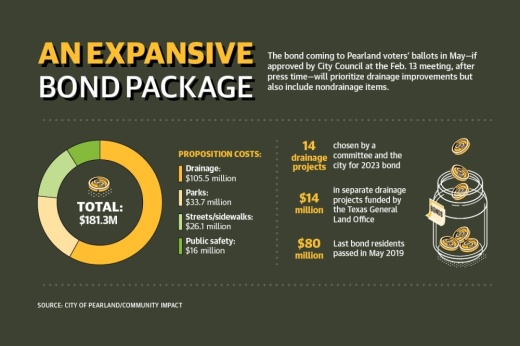The city finalized its list of projects to include in the bond and its projected financial impact on the city’s debt service fund and tax rate at its Jan. 23 meeting. City Council has until its Feb. 13 meeting, after press time, to call the bond for the May ballot.
Pearland Mayor Kevin Cole said implementing sweeping drainage improvements is important for a number of reasons, primarily safety and property values.
“If you’ve ever had your house flooded, or you know someone or have a loved one that’s had their house flooded, you would know how important [drainage] is,” Cole said. “We’ve seen enough large flooding events that these areas are necessary to shore up.”
The bond will be divided into four different pieces, similar to the city’s previous $80 million bond passed in May 2019, including the primary drainage proposition, a streets and sidewalks proposition, a parks proposition, and a public safety proposition. Each of these will be voted on individually, allowing voters to approve or disapprove of any aspect of the bond.
Pearland Director of Communications Joshua Lee said he encourages citizens to listen to City Council discussions relating to topics such as the upcoming drainage bond to stay informed on the city’s decisions and make an educated vote. He indicated that out of the city’s 73,000 registered voters in 2019, just 5,700 people, or about 8%, showed up to vote on the bond that year.
“All we want people to do is vote, you know, for or against,” Lee said. “We want them to be able to be informed and to get out there and vote.”
Drainage improvements
The 14 drainage projects included in the bond were ranked by priority with a number of factors, some with more weight than others, totaling a cost of $105.5 million for only the drainage items.
The factors included Hurricane Harvey’s impact, repetitive loss of homes, whether the home was in the 100- or 500-year flood plain, and age of infrastructure, to name a few.
Seth Thompson, who served as chair of the Citizens Drainage Bond Advisory Committee, said the age of infrastructure was given more weight in determining which projects to fund since some areas have been waiting for an update since 1965.
“Some of the older neighborhoods, their project might not have huge detriment and might not have a lot of losses or home losses, ... but it’s still a project that has flooding or issues to the citizens, and they’ve just been waiting forever,” he said.
The top priority item on the list of 14 projects is drainage improvements to Veterans Drive from Walnut Street to Mary’s Creek, costing $10.9 million.
This project was prioritized highest because the second place project—improvements to the Southwest quadrant of Old Town— is dependent on improvements to Veterans happening first. The $10.2 million Old Town project will take place from McLean Road to Hwy. 35, south of Broadway Street, and is a high priority item due to repetitive home losses and citizen complaints. The Shady Crest and Creek View subdivision and Longwood Estates roadside ditch projects are ranked close behind while facing similar issue.
Thompson said he learned in a conversation with the city’s Financial Adviser John Robuck that drainage bonds typically pass in Texas and that he expects it to be successful with voters. He said he believes the city’s litany of flooding issues in recent years, such as with Hurricane Harvey, will likely bring voters to be supportive of the items.
The Texas General Land Office will also fund $14 million worth of drainage improvements regardless of whether or not the bond is approved by voters. The projects include improvements to the Hickory Creek and Garden Acre subdivisions.
“We’ve got to make sure we get out there and let the citizens of Pearland know that ... we do think this is worthwhile to spend money on,” Thompson said. “These neighborhoods do need these projects to happen to prevent flooding in future events.”
Nondrainage projects
Nondrainage project choices were finalized at a Jan. 23 meeting, where the council chambers were filled with citizens attending to hear the council discuss adding new propositions to the bond.
The bond is set to include three additional propositions: a streets and sidewalks proposition, a parks proposition, and a public safety proposition.
The streets and sidewalks proposition will include construction on Hughes Road from Pearland Parkway to the city limit for $10.7 million, consisting of widening and a new bridge. Additionally, it will include a $15.4 million concrete replacement program for the city’s sidewalks.
The park proposition consists of funding the second phases of the Hickory Slough Sportsplex and Independence Park projects, costing $17.4 million and $16.3 million, respectively. Finally, the public safety proposition is a project building the city’s seventh fire station for $15.9 million.
Council Member Adrian Hernandez emphasized the importance of a prospective sidewalk improvement program that could be included in a streets and sidewalks proposition. He has previously also spoken in favor of completing the Independence Park renovation project; the first phase was completed in 2019.
“It’s [important to give] people a way to get to and from our beautiful parks that we build, and you’re not given the sidewalks to get there of course; you got to get in the car,” Hernandez said.
Cole said the projects will be divided into propositions because he predicted some voters may vote for drainage improvements but against other items.
“When you put [projects] on the ballot in different propositions, you’re giving the people the opportunity to pick and choose the buckets, if you will, that they want to do without saying yes or no to the whole thing,” he said.
Financial impact
A bond passed by voters will have an impact on the city’s tax rate that depends on the size of the propositions that are approved. Specifically, the city’s debt service rate will be impacted, which is one of the two parts that make up the city’s overall tax rate.
“We had to take into consideration the cost implications on the community,” Thompson said on selecting drainage projects with the citizens committee.
The city has an operations and maintenance tax rate, which is subject to voter approval. The other part is the debt service rate, which is how the city pays its debts to investors. The debt service rate for the fiscal year 2022-23 budget is $0.3388 per $100 of valuation.
A $181.3 million bond is projected to add 1 cent to the city’s debt service tax rate, which would cost citizens with a $250,000 home an extra $24.38 annually, according to a presentation from Robert Upton, director of engineering and public works at the city. This assumes all propositions in the bond pass.
Additionally, some of the nondrainage items will come with recurring costs on the city’s general fund, such as maintaining and operating some of the new facilities as well as one-time purchases of relevant equipment, Upton said.
The city had previously considered issuing a drainage fee for Pearland residents, which would have charged $5 a month for all residential properties, totaling at least $60 annually. The council voted the action down at a February 2022 meeting after receiving pushback from several members of the community.
Cole said the fee would have led to the council using certificates of obligation to address the city’s drainage issues, which would not have required voter approval. He said this and the fact the fee would have affected nontaxpaying entities such as churches caused the council to be split on the concept.
“What was missing in the fee discussion was the citizens,” Cole said. “Nobody was going out and letting the citizens come to the table and talk about any of this. Citizens don’t want to be flooded; they want good drainage. We need to hear from them directly on projects.”





